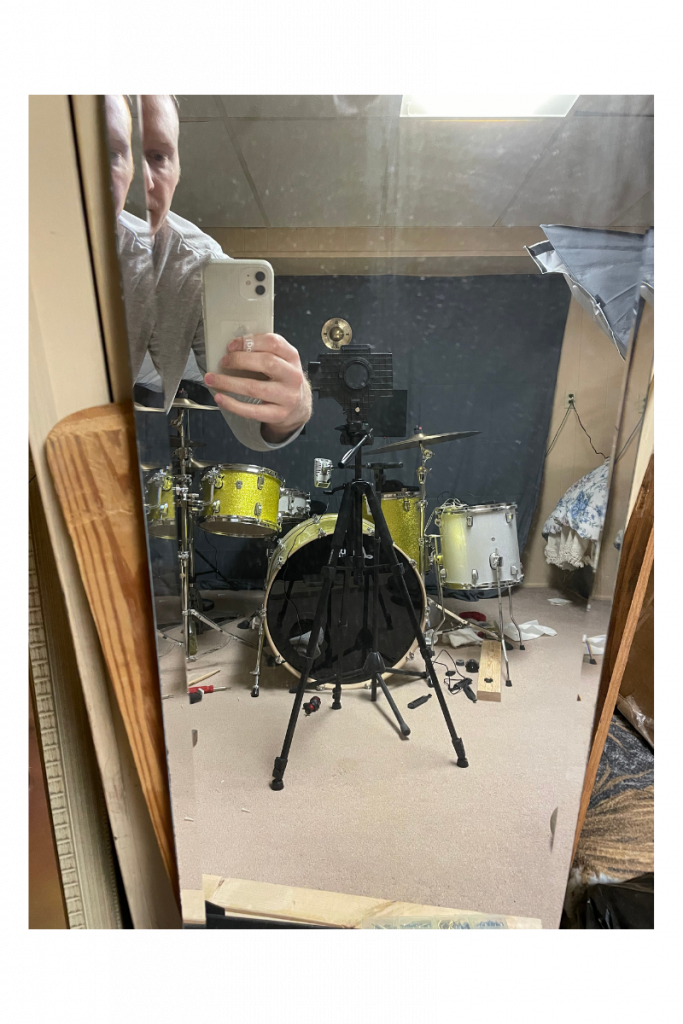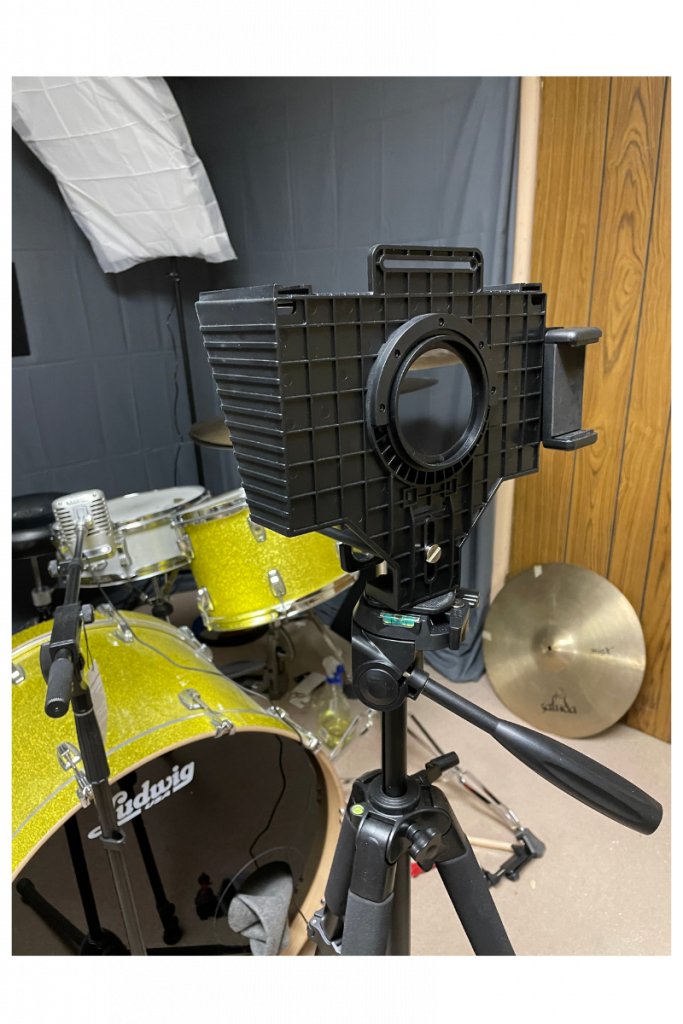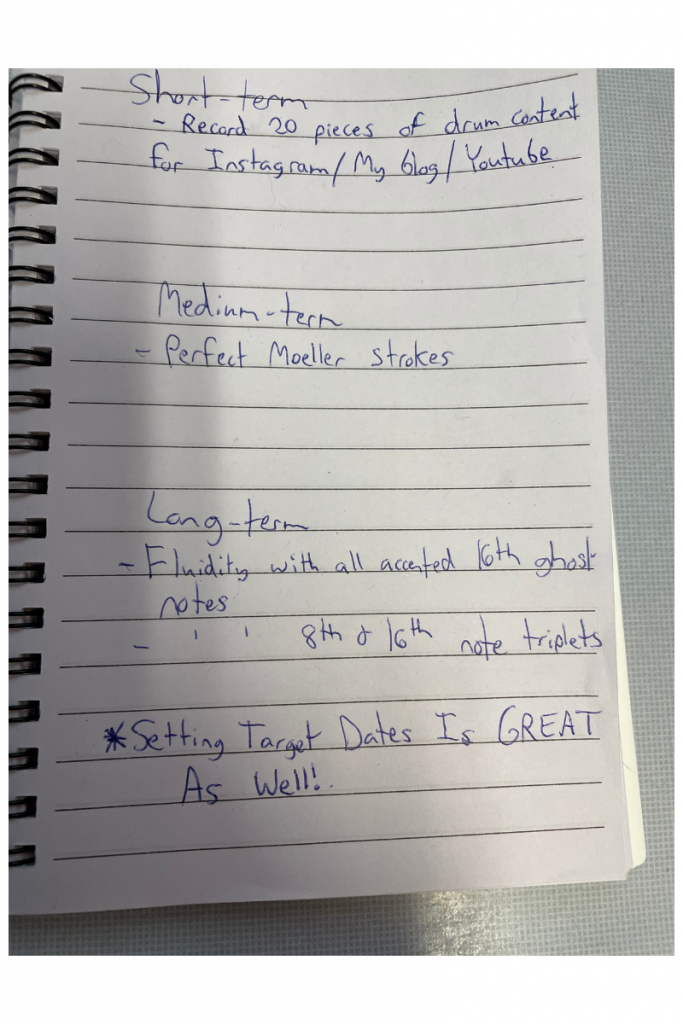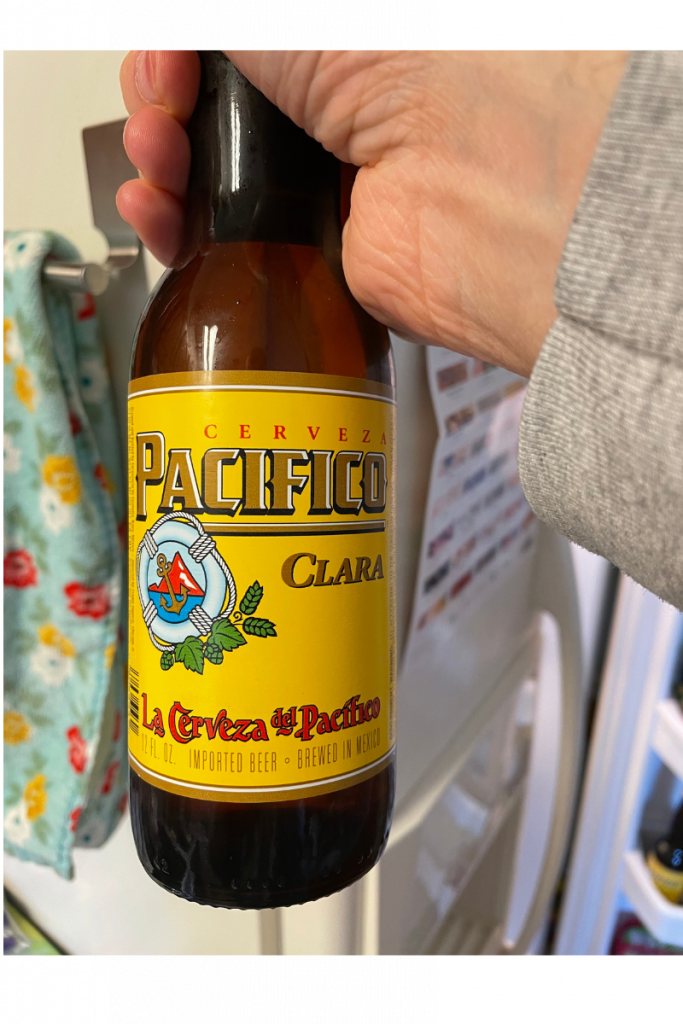Let’s Do This
Starting drums at 25 and looking for some guidance? It can be pretty daunting trying to learn anything new, but I’m happy to share some helpful tips with you.
Starting Drums The Right Way
These tips can save you a lot of time and frustration:
- Practice with a metronome
- Take your time and don’t rush
- Use a mirror
- Record yourself
- Don’t worry about a lot of drums and cymbals
- Don’t compare yourself to other drummers
- Write down your goals and progress in a journal
- Fortify concepts by jamming with other musicians and/or drumless tracks
- Celebrate small wins
- Stay inspired/motivated
Every single one of these pointers in conjunction will put you on the path to success. It may not be the easiest, but you know the old saying, “It’s a marathon, not a sprint.” As annoying as that is, it applies to learning drums as well.
More About Each Tip
It’s great to have a list of tips, but I want to explain each one a little more. This will give you some great actionable tasks that you can apply to start learning the drums as soon as possible.
Drum Tips Unleashed
- Practice With A Metronome
As a drummer, we’re expected to be the rhythm of the band. How can you be an effective time-keeper if you don’t have a steady pulse?
Practicing with a metronome is so essential to being a successful musician. It doesn’t matter what tempo you start practicing at, so long as you utilize the almighty metronome. Lol.

Are you practicing single stroke rolls or certain drum beats and/or fills? Regardless of what it is, get it down by playing against your ‘ol pal Metty the Metronome.
It’s also important to practice without a metronome, but it’s worth repeating so many times how vital this tool is for you as a musician. I keep saying musician because drummers aren’t the only ones who use metronomes.
I use the pro metronome app on my iPhone. There are also plenty of free online metronomes, like this one. Make it a strict habit to work on your drum chops with a metronome!
- Take Your Time and Don’t Rush
When practicing any new methods, concepts, or techniques, you’ll want to make sure that you take your time with whatever it is you’re trying to learn.
Rushing through without taking the time will make you become a sloppy drummer and we don’t want that. I know that you want to be a ninja fast drummer, but it starts with going slow.
Don’t play until it sounds good to you, but play until it FEELS good. This is something I’ve always heard and I try to remember it when I’m practicing.
If you take your time and embrace that ‘suck’ that is practicing (although I like practicing), it’ll pay off for you later down the road.
- Use A Mirror
This perfectly leads to this next bit about a mirror. Use a mirror when you’re practicing. You can get your hands on a wall mirror for under $10 or probably even cheaper at a thrift store.
You can just set it up a few feet away on your right or left-hand side. When you’re practicing, you’ll want to look at yourself in the mirror. Don’t get too carried away with it. Lol.
The point is to make sure that you are using proper technique. Is your posture correct? Are the heights of your sticks even with each other when playing?
You will start to catch things that need to be corrected and when you’re playing drums away from the mirror, you’ll be more mindful of those things.
Your reflection is really how people will see you play. If you look good and you’ve practiced looking good and feeling good, you’ll be more set up for excellence during a performance.
I’ve been using a wall mirror off to my left-hand side or to my front for several years during my practices. I know it has helped me tremendously. It may sound a little odd, but you’ll see a huge change for the better.

- Record Yourself
This is pretty much the same concept of using a mirror. If you record yourself, you’ll be able to watch what you’re doing later.
This is perfect for critiquing your performance and also for generating ideas! It’s really nice to become aware of problems you may be having on the drums, all by examining some of your own recorded material.

Fixing/readjusting how you sound and look comes so easy with a camera! I will still record myself very often to make sure I’m playing correctly.
- Don’t worry about a lot of drums and cymbals
This one is such a pet peeve of mine, but I’m going to try to stay objective. A lot of beginner/intermediate drummers think that they need a billion different drums and cymbals to make them a better drummer.
This couldn’t be further from the truth! In fact, I’d argue that the less surfaces you have to play on, the better. Imagine just having just a smaller piece drum kit and being able to rely on less, but really working your creative muscles.
A lot of drums and cymbals are super fun, but I feel you can push past plateaus faster if you start off playing on a smaller piece kit. You can always add more drums and cymbals as you get better, but try to master as many variations of rudiments, fills, beats on a standard size drum kit.

- Don’t compare yourself to other drummers
You wouldn’t be the only one to compare yourself. I know I’ve done it so much in the past and sometimes even catch myself doing it lately.
I really try to remind myself that I’m my own drummer and that I’m unique. I think you should really keep this mentality, especially when you first start playing.
Everyone has a different journey with skills/crafts and a lot of people tout their abilities, which may make us feel inadequate, but you’re different from me and I’m different from you.
At the end of the day, we are both just drummers trying to understand our instrument more. That’s really the driving force.
- Write down your goals and progress in a journal
You’re probably thinking this is something extra that isn’t worth it, but I can promise you it is! I like to write down my drumming goals. I normally will have short-term, medium-term, and long-term goals.
You can make them anything you want and it’s great to actually see them realized. Short-term can be a few months, while medium-term can be 6-12 months. Long-term can be anything past that.
It’s subjective really, but they are self-explanatory. What type of drummer do you want to be 2 months, 8 months, or 18 months from now (what will you have learned).
Writing down tempos I’ve crossed for certain things I’m practicing is also something I’d recommend.


It’s also super insightful to write down things that may have been challenging for me, or if I have a random tip that comes to mind. I can go back and see where I was several months ago and it’s a pretty invigorating feeling to see actual progress.
- Fortify concepts by jamming with other musicians and/or drumless tracks
This is such a great way to get your ideas and things you’ve been practicing out in the open! When you are playing with other musicians, there’s a certain realness that’s brought out for all participating parties.
A lot of the time, things I didn’t even know I had will show up in my playing. This is another example of something invigorating to see.
It also solidifies your sense of time as a drummer. If you are practicing with a metronome and working on improving that internal clock, it will show when you jam with other people (whether you all use a metronome or not).
If you can’t jam with other musicians, drumless tracks can be a great alternative! I use these a lot at the end of my practice sessions as a way to reward myself.
You can find these on Spotify and Youtube with or without a click track (metronome). Just type in, ‘drumless track’ or ‘drumless track 150 BPM’ (substitute for any tempo you desire).
They have tons of different genres you can jam with, so this is a great resource to discover some genres you want to delve into.
As a drummer, you are the backbone and the almighty clock. The band is looking for you to drive the train. You are the conductor, so don’t fail them! Drive the beat dammit!

- Celebrate small wins
This goes hand in hand with the goals you have written out for yourself. By the way, you don’t have to have a million goals. I recommend a few, that way you don’t focus on too much.
Celebrating small wins is important because it helps boost our morale. If you are practicing all the time and don’t make room to pat yourself on the back and relax/have fun/reward every once in a while, you’ll burn out.

You shouldn’t be doing it all the time to where it’s a distraction to effective practicing though. I think there’s a balance in there that varies with each individual. Focus on practicing way more, but insert small wins where they are well deserved.
- Stay Inspired/Motivated
This is the single most reason why habits don’t stick or we fail to stick to them (however you want to word that). I’m not going to go off on a tangent of how I’ve always stuck to my practicing.
It’s easy to fall off the bandwagon, but I manage to get myself back up to some sort of a practice routine. Life can get busy, but even a few minutes of practice is better than nothing.
There are ways that you can keep yourself inspired and motivated. There are so many groups of drummers on Instagram, Facebook, Youtube, etc. The drumming community just keeps getting bigger and it’s now easier more than ever to connect with drummers across the world.
Try finding accountability partners who will keep you motivated. It’s easier when you have someone rooting for you and vice versa.
Another thing I like to do is listen to my favorite drummers. This inspires me to want to actually practice as soon as I can.
Motivating videos can also be really helpful. Most of them are only a few minutes long, but they help you to remember the big ‘WHY’!
Why are you playing and practicing on the drums? Why do you want to get better? Is it because you want to impress someone, or you want to be able to play your favorite songs?
Whatever your why is, it should be a strong reason that will be your anchor in keeping a balanced practice regime.

Drums At 25 Or 65
So, if you are starting drums at 25, 30, or older, don’t fret! You’re never too old to start anything. You have the advantage of maturity on your side, which is a great benefit in actualizing your goals of getting better at the drums.
There are tons of stories of people actualizing their goals in various age ranges. There is also a great quote by Samuel Ullman that goes, “Nobody grows old merely by living a number of years. We grow old by deserting our ideals. Years may wrinkle the skin, but to give up enthusiasm wrinkles the soul.”
Now, I’m not super old, but not super young, but it is my goal to keep this mindset for the rest of my life. I know there will be things I’ll want to learn when I get older and I’m not going to let getting older stop me.
Just An Email Away
With so much information out there, I hope these tips have been able to help you. Feel free to reach out to me anytime at evan@attunedmusician.com with questions about any of these tips, or anything else.
You can comment below with any questions you have too! Find solace in the new and depart, my child.
Also, be sure to check out the gear that has made my life easier as a drummer here.

 On Your Gear!
On Your Gear!